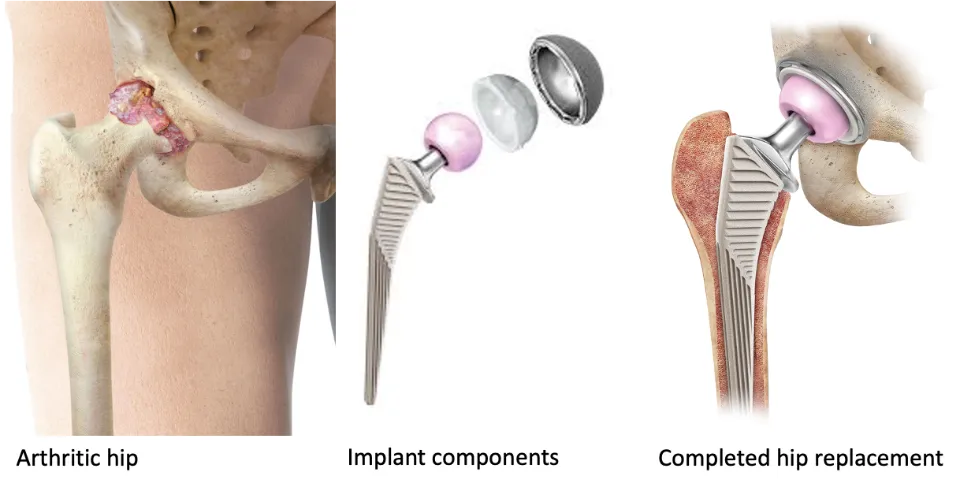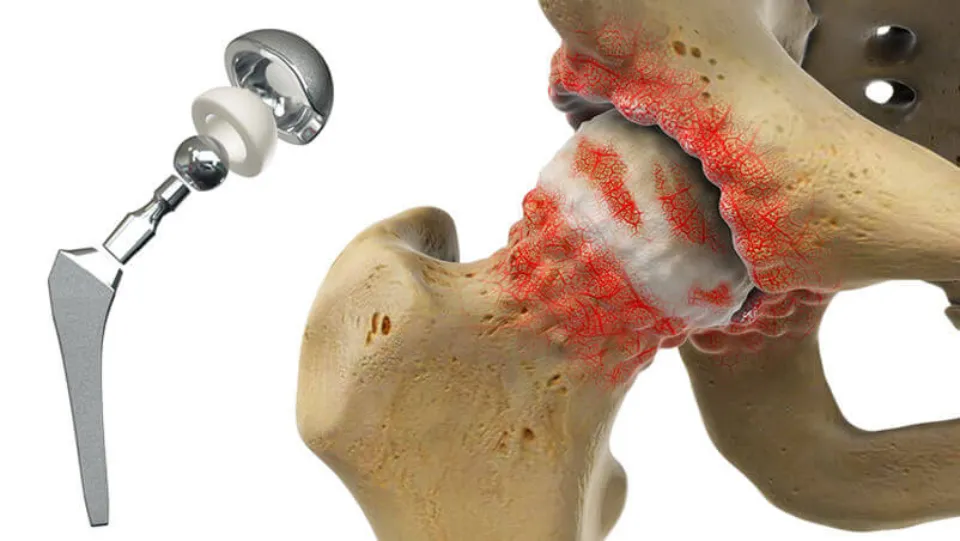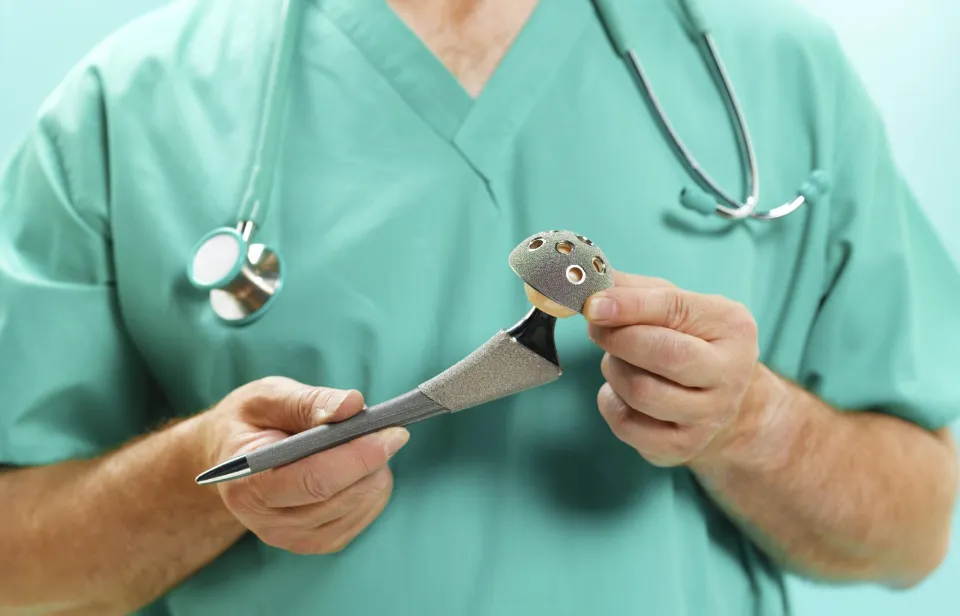An artificial hip joint (known as a prosthesis) is used to replace a damaged hip joint during a hip replacement, a common procedure.
If one (or both) of your hip joints suffer damage and you experience chronic pain or difficulty walking, driving, or dressing yourself, you may need to have a hip replacement.
What then must you do to get ready for hip replacement preparation surgery? To learn the solution, keep reading.
Read more: A Complete Guidance of Knee & Hip & Shoulder Replacement (2023) – Elder VIP
What Happens During Hip Replacement Surgery?
Both a general anesthetic, where you are asleep throughout the procedure, and an epidural, where the lower body is numbed, are options for hip replacement surgery.
The damaged hip joint is removed by the surgeon through a hip incision, and it is then replaced with an artificial joint made of a metal alloy or, in some cases, ceramic.
The procedure typically takes 60 to 90 minutes to complete.

Tests Are Done before Hip Replacement Surgery
Medical Preparations
Appointments
You will receive a schedule of your required presurgical appointments from the office assistant of your surgeon. In general, you’ll need to do the following before hip replacement surgery:
- Set a surgery date with your doctor’s practice assistant during an office visit.
- Talk to your surgeon about the risks of surgery during an office visit.
- Make an appointment with your primary care physician and any specialists who are currently treating you if your surgeon requests it so that you can receive preoperative medical clearance.
- Visit our Prepare Clinic two to three weeks prior to surgery to make preparations for a successful procedure and quick recovery. Your surgeon’s office will make an appointment for you with a practice coordinator.
- Make any additional preoperative appointments that are listed in the letter from the practice coordinator of your surgeon.
- The nurse-patient navigator recommends that you attend the preoperative education class. You are welcome to bring family members or a caregiver along with a list of any questions you may have to this class.
- Find a suitable facility if, following surgery, you’re interested in receiving outpatient physical therapy. It’s best to locate a facility well in advance of surgery and confirm that it accepts your insurance because many physical therapists are booked weeks in advance. Give us your choice, and we’ll fax you a recommendation.
Drugs and Supplements
- Stop using all NSAIDs (nonsteroidal anti-inflammatory drugs) seven days prior to surgery, including aspirin, naproxen (Aleve), and ibuprofen (Advil, Motrin). They disrupt blood clotting, which can result in more blood being lost during surgery.
- The Prepare Clinic and the physician who prescribed blood thinners (anticoagulant drugs) will decide how long before surgery you should stop taking them. These include apixaban (Eliquis), dabigatran (Pradaxa), enoxaparin (Lovenox), warfarin (Coumadin, Jantoven), and clopidogrel (Plavix).
- Stop taking the majority of supplements seven days before surgery. Examples include fish oil, vitamin E, ginkgo biloba, ginseng, glucosamine, and ginseng. During your consultation with the Prepare clinic prior to surgery, you will go over this in greater detail.
- Up until the day of surgery, it is acceptable to consume Celebrex (celecoxib) or Tylenol (acetaminophen) products.
Dental Evaluation
Prior to surgery, serious dental issues must be resolved. The bloodstream may be exposed to bacteria during a dental procedure, which could lead to an infection that spreads to your artificial joint.
Prior to the day of your joint replacement surgery, make sure to schedule a visit with your dentist. In the two weeks prior to your scheduled surgery, let your surgeon know if you will require dental work.
Home Preparations
Making arrangements for your return home after surgery will help you recover in the most comfortable way possible.
Organizing Support
Upon returning home, you’ll require assistance with self-care. For the first week, we advise that a relative or friend stay with you constantly. Find someone who can assist you and has the necessary time. In order for a discharge planning nurse to talk to you about your options if no one is available, kindly let us know.
Plan for friends, family, or neighbors to stop by and offer assistance if necessary. Your caregivers will have less to do if you freeze meals in advance and stock up on prepared foods.
On the day of your discharge from the hospital, make sure to make arrangements for someone to pick you up. Also, you’ll need someone to drive you to your follow-up appointments.

Preparing Your Home
Consider buying or borrowing helpful devices such as:
- A raised toilet seat (an attachment that adds height)
- A bathtub or shower chair
- A reacher/grabber tool
- A shoehorn and a sock aid (a device that lets you slip socks on without bending over)
These products are available both online and at a large number of pharmacies and medical supply stores.
To prevent accidents at home, we recommend:
- Making pathways in crowded areas
- Removing throw rugs
- Securing extension and telephone cords so they’re not strung across the floor
- Installing handrails in your bathtub and on stairways
- Placing important items where you can easily reach them
Packing for the Hospital
Bring crutches or a walker with you to the hospital if necessary. If you don’t, the hospital will give them to you before releasing you.
Please pack the following:
- Dental hygiene supplies, deodorant, and other toiletries (the hospital also has the essentials.)
- Comfortable, loose-fitting clothes
- A knee-length robe and slip-on shoes
- A cell phone (optional)
- ID (driver’s license or passport)
Please do not bring:
- Valuables, such as jewelry, wallets and watches
- Medication (The hospital will give you any necessary medication.)
Tests to Be Done
Some of the most common tests done before surgery include:
- Chest X-rays. X-rays can be used to identify the origins of cough, chest pain, shortness of breath, and some types of fever. They can also aid in the diagnosis of irregular heart, breathing, and lung sounds.
- ECG stands for electrocardiogram. The heart’s electrical activity is captured during this test. It identifies heart muscle damage, demonstrates abnormal rhythms (arrhythmias or dysrhythmias), and aids in determining the cause of chest pain, palpitations, and heart murmurs.
- Urinalysis. This examination can be used to identify diabetes, kidney, bladder, and other infections. Illegal drugs may also be detected in the body during specific urinalysis procedures.
- White blood count. This examination can aid in the diagnosis of some fevers and infections. Additionally, it can reveal whether a person is taking any drugs that lower white blood cell counts.
Conclusion
Prior planning and preparation for hip replacement surgery can hasten and ease recovery, reduce the risk of complications following surgery, and offer a sound and secure foundation for a return to daily activities.



